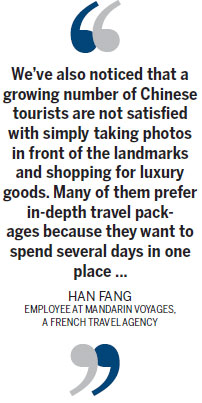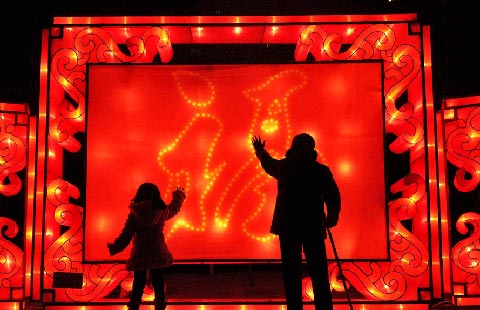As spring days beckon, so does Europe
Updated: 2014-02-14 08:50
By Fu Jing, Zhang Chunyan and Li Xiang (China Daily Europe)
|
|||||||||||
High spending
As incomes and living standards rise, more Chinese visitors are demanding high-end facilities during their trips, says Shao. "Some tourists are not satisfied with three-star hotels and choose four- or even five-star establishments instead."
These high-spending tourists have become an increasingly welcome sight in the UK and across Europe, and every country wants to capitalize on the trend.
"The one-day shopping trip to Bicester Village, an outlet shopping center, is gaining popularity among Chinese visitors," Shao says.

Chinese visitors to the UK spend three times as much as Arabs, Russians or other traditional big spenders, Vince Cable, the UK business secretary, said in a recent article for the London Evening Standard.
The number of visitors from the Chinese mainland rose from 89,000 in 2009 to 179,000 in 2012, he said. Preliminary figures for 2013 (to the end of the third quarter) have already hit 160,000, suggesting a record year in store.
"I want to ensure that Chinese visitors - be they tourists, business visitors, students or family members - are made welcome in the UK," Cable said.
By contrast, because Belgium is not a major destination for visitors during the Spring Festival holiday, Chinese tourists are not the main focus for the country's travel industry, says Dominique Andre, manager of New Markets at Wallonie-Bruxelles Tourism in Belgium.
"At present, we are not marketing or doing a lot to attract Chinese tourists because we focus more on the neighboring markets. I think the northern part of Belgium is marketing itself in an effective way in China, and the Brussels region wants to attract more Chinese visitors and become more international," she says.
However, the situation in Wallonia is different because the region is renowned for its natural scenery, festivals and culture, and most Chinese tourists prefer to visit cities for shopping, she says.
Andre believes Belgium needs to focus more on "deep travel" and promote special attractions: "Tourists prefer to visit something typically European, but different from other European cities. Therefore, we have to focus on what the Chinese would like, and focus on the very specific products of certain cities." She suggests that more money and investment are needed to facilitate exploration of the Chinese market.
Last year, Chinese travelers to Belgium registered more than 11,000 purchases with Global Blue, a financial company that pioneered tax-free shopping services. Those visitors spent an average of almost 800 euros ($1,080) per purchase, which resulted in Chinese shoppers accounting for 15 percent of total tax-free business in Belgium.
The company says 60 percent of all Chinese purchases were fashion and clothing, including bags, while watches and jewelry accounted for 28 percent. However, Global Blue says that it has not seen a marked increase in spending during the Spring Festival period because most Chinese buy their goods in Europe around May 1, during the summer months and the so-called golden week in autumn.
Today's Top News
Germany, France eye new data network
No much progress in Syria peace talks
Lantern Festival fires kill 6 in China
China urges US to respect history
KMT leader to visit mainland
11 terrorists dead in Xinjiang
Illegal detention reports probed
4 die in Austrian train-car crash
Hot Topics
Lunar probe , China growth forecasts, Emission rules get tougher, China seen through 'colored lens', International board,
Editor's Picks

|

|

|

|

|

|





